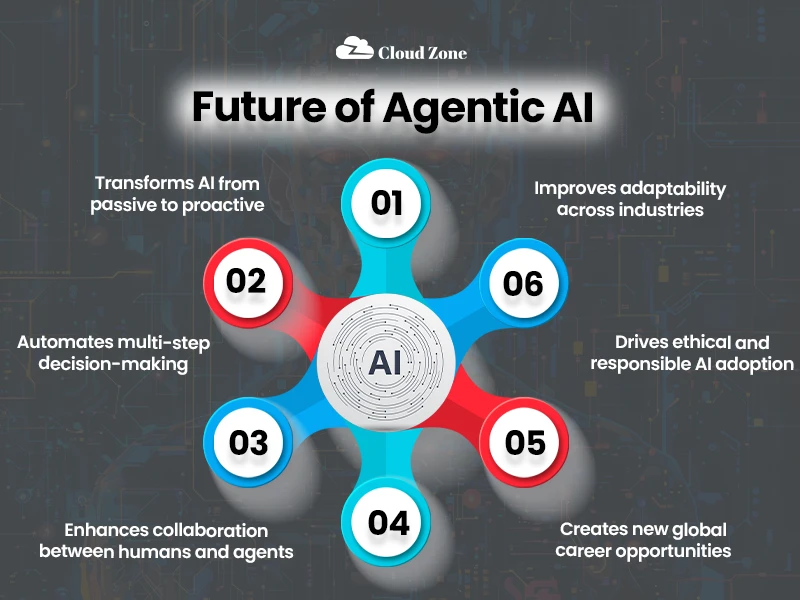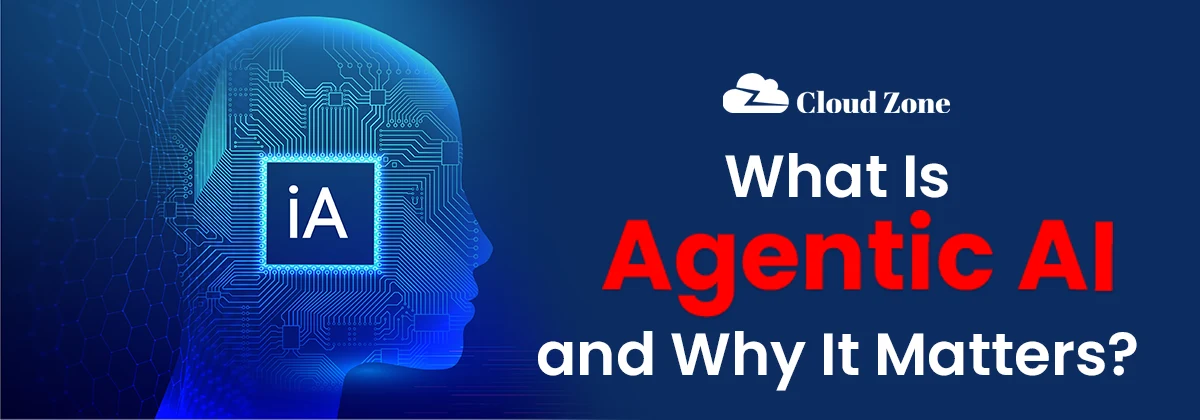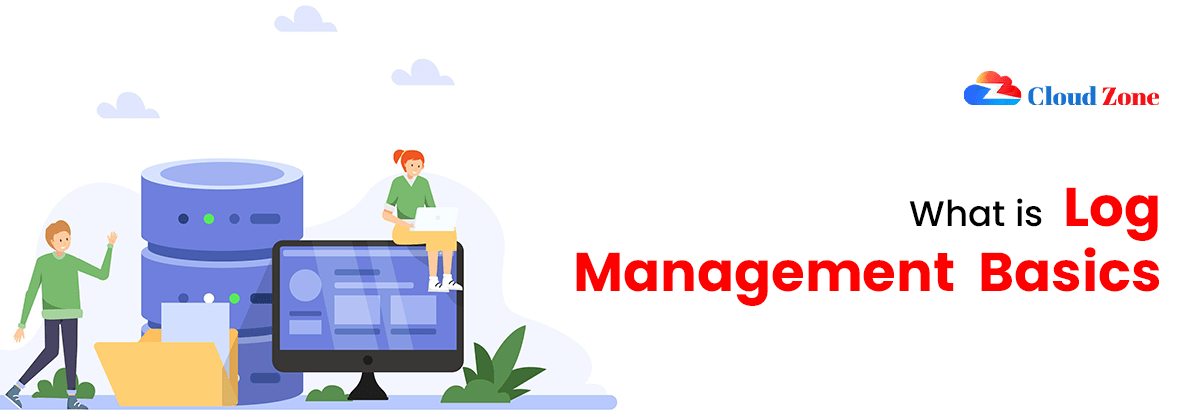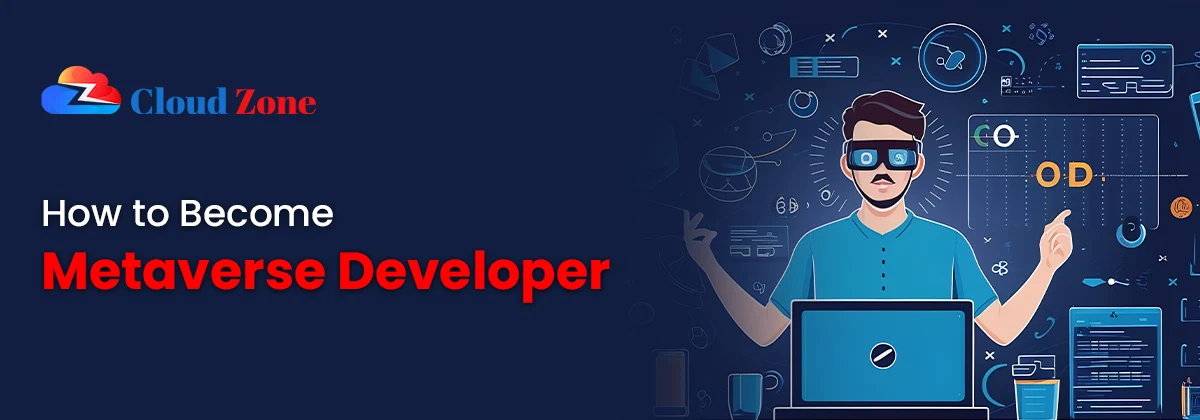Table of Contents
ToggleDid you ever wonder What is Agentic AI and Why It Matters? Think about artificial intelligence instruments that will not only wait until you tell them what to do but can initiate, make decisions, and even get things accomplished on your behalf, without being instructed what to do at any given time. That is exactly what this offers.
Unlike more traditional AI systems, in which a system needs to act when commanded to act, an agentic AI can analyze objectives, plan actions, and take multi-step actions on its own. This paper will unpack the concept of this AI, why it is considered the next giant leap in artificial intelligence, and the distinction between this and other AI frameworks. We will also address real-life examples, challenges, and opportunities of AI agents in areas such as healthcare, finance, and IT functions.
At the end of this article, you will not only have a good understanding of what agentic AI is and how it operates, but you will also have clear-cut insights into how it can be applied to transform businesses, streamline processes, and create new opportunities that will make you better positioned to apply this new technology to your own industry.
What is Agentic AI and Why it Matters?
At its core, what is agentic AI? It represents an AI paradigm in which systems cease to be passive instruments and instead become agents, who are capable of choice.
They are not input-output responses since they:
- Goal contextualization.
- The skill of dividing the hard tasks into a few steps.
- Waltering with other human beings or agents.
- Practicing and working towards their behaviors.
- Assuming needs ahead of time.
- New responses to emerging changes or priorities.
- Being given the mandate to suggest or apply the most appropriate solutions.
That is what makes this AI the antithesis of the static AI models. It is a smart program and, at the same time, it is also a digital assistant, a dynamic problem solver, and a lifelong learning companion.
What Is an AI Agent?
To get a comprehensive perspective on this, we need to address the question: What is an AI agent? An AI agent is a software that is driven to act independently within a specific environment. To clarify, an artificial intelligence customer support agent does not answer questions directly, although it will be able to read the goals, redirect to the corresponding department, or even refund money when it is required. They are independent agents and do not necessarily have to rely on human beings in order to carry out their activities. They are also learning to solve more complex and real-world problems as they grow.
AI agents:
- Feel what is taking place around them (with data inputs)
- Make decisions based on goals and policies.
- Act to achieve results
- Learn and get feedback on future performance.
- Anticipate the requirements of users and suggest proactive solutions.
Cooperate with other systems or agents to be effective. This makes them important constructs of these systems.
What Is AI Agent, and What Is AI Agents?
It is quite easy to confuse what AI agent (singular), and AI agents (plural).
• What is AI agent? It is a self-contained piece of software.
• What is AI agents? There are a few agents who can work together or compete to accomplish challenging problems.
For example, in logistics:
- The maximum storage in the warehouse can be achieved by one AI agent.
- Multiple AI agents can control their delivery fleets, demand forecasting, and shipping rerouting in real-time.
It is this scale capacity that has rendered this AI such a formidable force; it is not one system, but a system of intelligent beings that are in interaction with one another.
Discover how Agentic AI transforms education through personalized and interactive learning methods.
What Is an AI Agent Definition?
Before diving deeper, it’s helpful to clarify what is an ai agent definition.
In simple terms:
A software application capable of analyzing its environment (using data), making choices, and potentially performing steps to achieve an objective, without necessarily being directed by step-by-step instructions, is called an AI agent.
In other words, it is as though software has been given the power to think and act within its limits. An AI agent, unlike ordinary programs, can adapt its actions to different circumstances by reacting to a specific command. This is what enables it to be applied in solving real-life problems, experience learning, and collaborating with humans like a digital assistant.
How Agentic AI Differs from Generative AI
Aspect | Generative AI | Agentic AI |
Core Function | Creates content (text, images, code, etc.) on a prompting basis | Takes initiative to accomplish objectives as an autonomous system. |
Input/Output | Input: PromptOutput: Generated content | Input: Goal/Task Output: Completed actions and outcomes |
Orientation | Creative/expressive | Goal-oriented / action-oriented |
Autonomy | Reactive (reacts to given stimuli) | Proactive (can take action without the need to be constantly prompted) |
Scope | Only generating ideas, drafts, or designs | Above generation to execution (eg, emailing, updating a system) |
Decision-making | Offers alternatives, recommendations, or drafts of a decision-making process. | Makes choices, prioritizes, and executes decisions |
Example | “Here is a draft client email.” | “I saw a client problem, wrote the email, sent it, and recorded it in the CRM.” |
Dependency | Requires a human to execute actions | May run autonomously or with little supervision. |
Value Add | Increases creativity and productivity | Increases the efficiency and automation, and goal accomplishment. |
Shape your career through AI-driven learning experiences.
Key Features of Agentic AI

The average systems will include:
Independence: They do not want to hear it all. This is why AI agents can work independently once the goal is set, which saves time and reduces the need to monitor human behavior all the time. They can work on repetitive or time-sensitive jobs without any problems since they are independent.
Context Awareness: This means a person can understand contexts and modify behaviours. They filter information around them to be aware of what is going on. It is also through this awareness that they can alter strategies in order to adapt to the real world.
Collaboration: Co-operation with individuals and other agents. Instead of going solo, AI agents can share information and communicate with people or systems. It is the team co-operation that leads to faster and more efficient problem-solving.
Self-Learning: Improving in every activity. Some of their failures and successes are acquired as they grow older and become wiser. The reason is the continuous learning; the more they are repeated, the more reliable and effective.
Ethical Decision-Making: There should be a balance between effectiveness and safety, and between justice and ethics.
More and more agents are being developed in morally appropriate ways. This renders their activities effective, safe, transparent, and fair to all the stakeholders.
Applications of Agentic AI
There are several fields where this is already causing a buzz:
- Healthcare: patient management: patient triage, booking an appointment, and even treatment advice.
- Finance: Detection of fraud, adjustment of investment portfolio in real time.
- IT Operations: Automatic systems that find bugs and fix them.
- Customer Service: Digital workers that can resolve end-to-end complex problems.
- Manufacturing: Keeping machines running smoothly and improving how materials move
The Future of Work with Agentic AI
Employing this AI will change the nature of work. Workers will not be working with tools; they will work with digital servants.
Imagine:
- Marketers who have AI agents perform tests on ad platforms.
- Onboarding and compliance HR teams that are agent-supported.
- Skill Developers agents that can test, deploy, and monitor applications automatically.
The result? Individuals are masters of creation and are skillful, tactical, and empathetic warriors who have repetitive organizational duties.
Challenges and Risks of Agentic AI
Despite having potential, this is associated with risks:
- Loss of Control: Too many independent agents can act unpredictably.
- Bias and Fairness: The agents making scale-based decisions are likely to have more biases.
- Security: New malicious uses of autonomous agents generate new threats.
- Accountability: Who is responsible for the agent in the event she or he makes a harmful decision?
These problems need proper governance, morals, and proper AI architecture.
What is Agentic AI and Why it Matters in 2025 and Beyond
In order to go on, it is as much of technology as it is of the decade of the digital transformation. This is because it will enable:
- Scalability: 1 agent can do the job of dozens.
- Resilience: When systems experience failures, they do not break.
- Innovation: Since man no longer needs to conform to the norm, one can focus on innovations.
- Global Competitiveness: It will be dominated by countries and companies with good agentic AI.
In short, this is that which resides between machine performance and human creativity.
Skills Needed to Work with Agentic AI
As a way of getting your career on track in the future, you may want to consider building a blend of both technical and soft skills. Start with the fundamentals of machine learning and AI, and its principles, such as the functioning of a neural network or reinforcement learning.
So, to create and combine AI systems, one should be familiar with programming languages like Python, JavaScript, or Go. System design, distributed systems operation, and APIs should also be familiar to you. Ethical knowledge is also important, so you can ensure AI is responsible, safe, and fair. And finally, good teamwork skills will help you to work with people and AI agents alike, successfully.

Conclusion
So, what is agentic AI? Not only the next stage of artificial intelligence, but it is also the change to active digital partners of the digital team. We get to know what is an AI agent, when we clearly understand that they are not just programs but autonomous agents that can transform industries. Those that succeed are the organizations that adopt agentic AI as they enter 2025 and beyond.
Whether you’re a business leader, developer, or student, now is the time to explore agentic AI.
Do you want to truly understand what is an AI agent definition and how to use it in the real world?
Enroll today at CloudZone and start building the future with AI.

Sukhamrit Kaur
Sukhamrit Kaur is an SEO writer who loves simplifying complex topics. She has helped companies like Data World, DataCamp, and Rask AI create engaging and informative content for their audiences. You can connect with her on LinkedIn.




